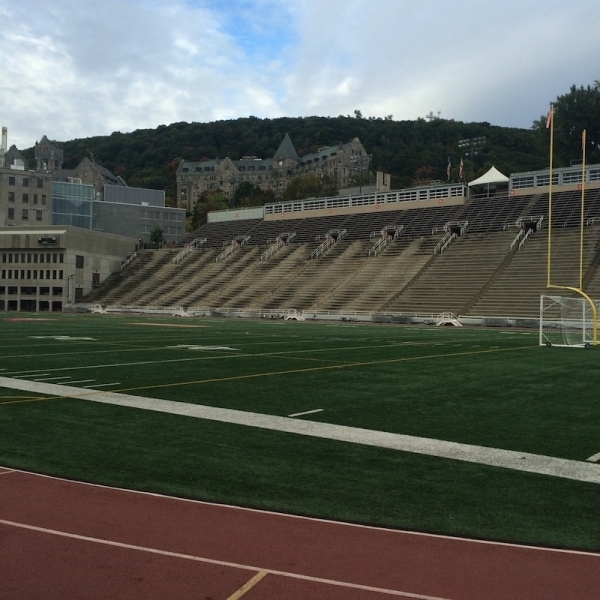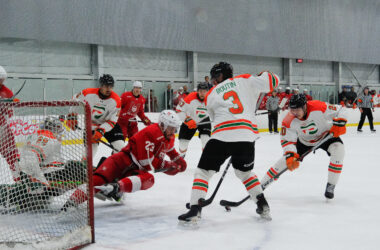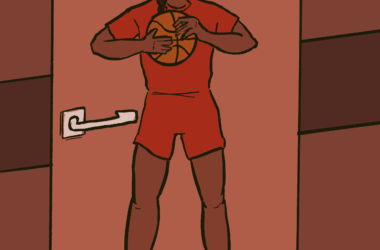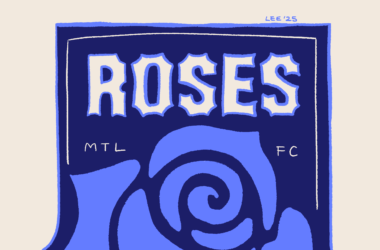After building toward a championship victory for months at a time, the end of the season leaves players and coaches alike in a trance—the championship hangover. Coming off his team’s fourth straight CCBA championship, Redmen baseball Head Coach Jason Starr confirmed this predicament to The McGill Tribune.
“Two weeks,” Starr said. “It takes me two weeks to sit there and say I need a two-week break from the season, and then we’ve got to get back on the train.”
And what a train it is. From scheduling games and practices to recruiting, plenty of offseason phone calls and meetings go into making a season run as well as it does. It’s a never-ending cycle: By the time the previous season ends, preparations for the next one have already begun. McGill’s coaches, who often juggle full-time work in addition to their McGill Athletics commitments, are always locked in, even if their team is not out there competing. While regular season matchups and championship finishes catch public attention, much of the important work happens in the offseason, including scouting, preparing training plans, and game strategy.
For Martlet basketball Head Coach Ryan Thorne, the final buzzer of a season-ending tournament loss at Nationals in Regina on March 11 didn’t signal the true conclusion of the 2017-18 campaign. There were a few things to take care of first, starting with the final team dinner after the game. Next, their flight home to Montreal got delayed, and the team was stuck in Toronto for a few extra hours. Nine days later, Thorne sat down with the Tribune, just as the book on the past season was finally coming to a close.
“From that last game, we’ll give them a week where we limit that contact, let [the players] get back into everything they need to do academically without us bothering them,” Thorne said. “And then we’ll have our exit meetings [the following week].”
After exit interviews wrap up, the Martlets flex other muscles until exams end on May 1. For Thorne, it’s time to accomplish the little, inconspicuous tasks that make the season run.
“We don’t just show up [on the court] and say, ‘Let’s go roll a ball out there,’” Thorne said. “There’s a plan that goes into place. We do all that planning between now and May.”
Just over a week after his team’s final game, Thorne was busy fielding calls to plan out the next season’s schedule. His main concern was creating a balance between his players’ academic obligations and a demanding basketball schedule.
“What we try to do is not overload [the players],” Thorne said. “This is the time where we look at […] schedules. Where can we travel? When can we travel, just based on all of these [factors]? So, that’s what we figure out now.”
For the dominant Martlet basketball squad, who won their seventh consecutive conference title in March, preseason exhibition challenges from teams south of the border keep the group in top form for when league play begins. The McGill basketball teams generally play against NCAA schools in early August, which means they require a waiver from U Sports to allow freshmen to compete. Under U Sports regulations, incoming players cannot participate in formal team drills until Aug 15.
Throughout the offseason, Thorne remains in close contact with his assistant coaches; however, he is the only full-time employee of his staff.
“There are a lot of teams across the country that have full-time assistant coaches,” Thorne said. “We’re not fortunate enough to have one right now. We just try to script it so that everyone gets involved but without overloading my assistants, either.”
In the summer, availability is a matching game between players, coaches, and gym times. Coordinating all of the moving pieces can be a significant hurdle for McGill’s teams. During May and June, players and gyms are free during the day, but Thorne’s assistant coaches are working at their day jobs. In July, summer camps occupy the gyms, so space is only available at night. That’s when everyone gets together for workouts.
Even though he works full-time as Martlet head coach, Thorne balances that job with a number of other roles: He helps select McGill Athletics award recipients, works on the coaching staff for the Canadian Women’s U19 basketball team, and serves as the president of the Women’s Basketball Coaching Association for Canada.
Other McGill sports teams are even less fortunate than the basketball team, as they rely fully on an all-volunteer staff. McGill Redmen lacrosse Head Coach Tim Murdoch has volunteered his time for the last 15 seasons, all while leading his own consulting firm outside McGill. The bulk of his coaching commitment comes during the team’s August-November season. Murdoch has the team elect captains at the end of the fall season for the following year, which allows him to step back as his team prepares for exams and trains under peer leadership.
“I don’t see the guys much [from November to April],” Murdoch said. “I don’t want them to get sick of the sport, but we lean on our captains in the offseason to play the leadership role in terms of training and conditioning.”
With his captains working hard to lead offseason drills, Murdoch can devote his time to his day job and tasks such as recruiting.
In December, he attended the Oceanside Hustle, a major recruiting event on the lacrosse circuit in Oceanside, California. The tournament’s structure allowed him to watch hundreds of players from 120 competitive high school and club teams across the United States. Before spectating the event, Murdoch identified several critical recruiting targets, and during the action, found even more potential Redmen. Such events are vital for constructing the team’s roster and creating positive momentum for recruiting players in the future.
“[After taking part in these recruiting opportunities,] we suddenly have two Californians on the roster, and all of a sudden, kids from California will notice [McGill’s program],” Murdoch said.
As with coaching, recruiting is a year-round gig. Coaches work hard to solidify their rosters for not only the immediate season, but for many years to come.
“There’s no rest for [recruiting],” Thorne said. “We’ll have some kids on the list who aren’t [eligible] for 2018 but are for 2019.”
Furthermore, recruiting is not a one-man show. It takes an effective plan and good communication to get the job done.
Starr and his associate head coach and recruiting coordinator Casey Auerbach travel together to the U.S. for recruiting showcases. Once they’ve identified potential recruits, Auerbach will directly contact them as the duo aims to get to know the student behind the baseball player.
“We’ll organize day trips and night trips for the guys who will stay with our players to determine [if they’re] a good fit for the program,” Starr said. “[We ask] not only are they good baseball players, but are they good fits? Throughout the years, we’ve learned that fit is more important than the ballplayer [himself.]”
The final piece of the puzzle comes at the very beginning of McGill’s Fall semester. As the offseason winds down, many McGill teams hold open tryouts weeks before the season begins.
“Because of the reputation of McGill, there might be a kid who we didn’t know about, who didn’t know that McGill had a basketball team but was coming here just for academics,” Thorne said. “And now she’s a talent and she loves basketball.”
After a long summer of training, recruiting, and planning, McGill’s coaches move into the fall eager to see their hard work pay off. The offseason is a critical component of McGill teams’ success, as it allows athletes, coaches, and staff the time needed to reset and recover from the previous year. Then, once the next season starts, it’s full steam ahead for McGill’s coaches.
“In that [March-May period] also, there’s some vacation time,” Thorne said. “[But] once you get going, you get going.”








